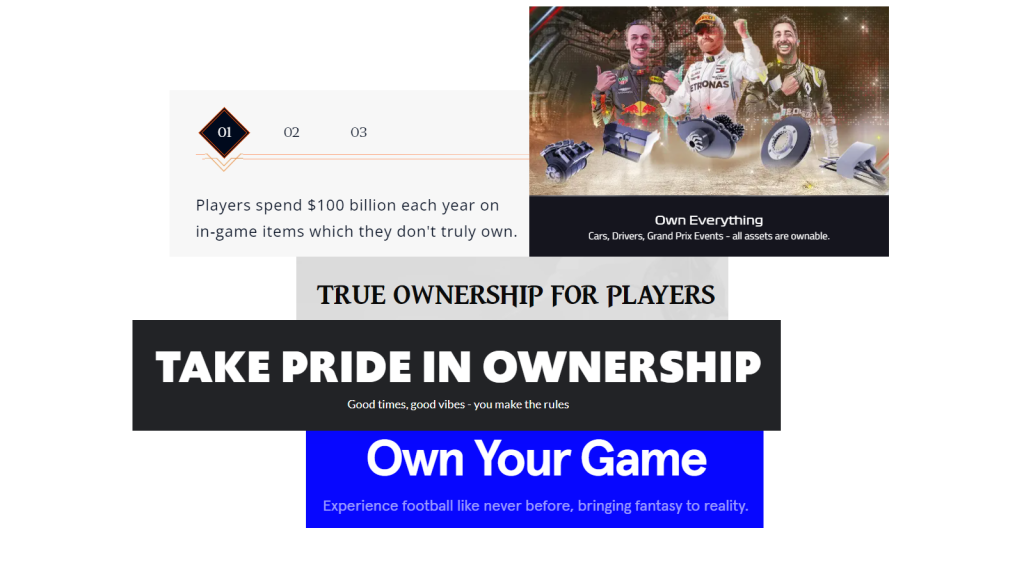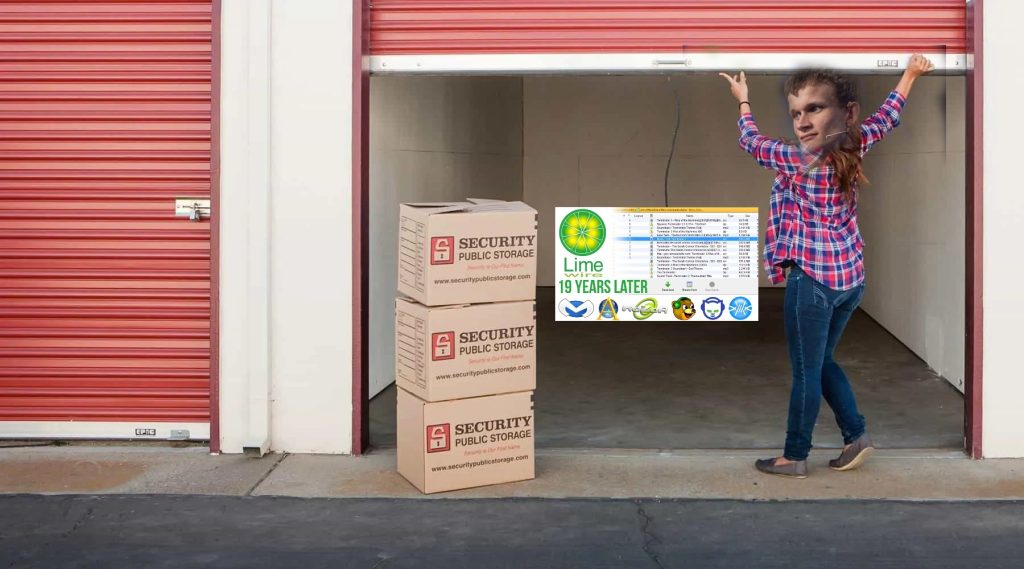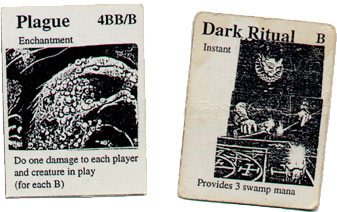Take a stroll through a blockchain game website – they are all lovely; remember that’s their UA funnel! – and a standard set of phrases appear: “ownership,” “true ownership,” “truly owning.”

But blockchain warps the traditional meaning of ownership into a ship of Theseus problem; each blockchain-based game can define ownership in its context. Suddenly, ownership becomes a design space in itself, making it all that much more crucial to dissect and analyze.
There are three stylized notions worth exploring:
- Ownership versus Licensing
- Item Possession versus Key Possession
- Obligation to Honor
Does a License Count?
A few years back, John Deere faced a legal challenge over preventing customers from repairing tractors. The key legal question was the extent of ownership.
John Deere’s license agreement prohibits new tractor owners from tampering with the “Security Measures” on embedded software. Right to Repair advocates want the ability to modify this software to perform repairs and modify their machines. After all, farmers own their tractors, shouldn’t they be allowed to edit or replace their software?
Ask a bystander what it means to own something, and they’ll say something along the lines of “the ability to do whatever you want with it.” But a definition like this would leave out the 58% of homeowners under Homeowners associations (HOA). These associations sometimes prohibit things like painting your house pink without authorization. HOAs intend to protect the value of the community from negative externalities; a pink house or a boat in a neighbor’s driveway can reduce the value of the homes around it. Despite the restrictions, we’d still consider someone the “owner” of an HOA house.
Deere and HOAs demonstrate that ownership is not a single “ability” but rather a bundle of “abilities” or rights. Such a view is consistent with Adam Smith’s conception of property. And while blockchain can facet such abilities, the abilities themselves derive from a socio-legal institution rather than a technological one. In nearly all cases, blockchain games don’t confer “true” ownership of an asset beyond the ability to buy and sell. It’s definitely something, but perhaps it’s a bit of a stretch to consider that single ability “true” ownership.
Being on the blockchain guarantees little; the design space is vast. And that’s a good thing. It just might not lead to the world cryptonites 1 imagine.
Sorare and the Metaverse Fantasy
In a claim repeated so many times, I’ve nearly become queasy; cryptonites imagine a future where players “import a CS: GO skin into another game” or move assets from title to title.
Supposedly, this sort of possibility builds the metaverse (I’m still confused on the whole metaverse thing). But most blockchain games do not have the legal or technological framework for a “game IP as a platform” to occur. Take Sorare as an example, a firm I’ve written about before. A player cannot take “their” football cards and build a new mode or FIFA-like game utilizing them. “Ownership” does not imply an unlimited license or even an exclusive one to the token owner.

Blockchain ownership doesn’t mean copyright, but it can. The demands of external IP holders limit Sorare, and nearly all games using 3rd party IP will likely be limited in the same way. The “interoperable” world fantasized by cryptonites will require original IP or a new middle ground of copyright rules. A new copyright paradigm may come forward, and to be fair, we have seen layer-two games like KittyRace, based on CryptoKitties, emerge. Sky Mavis has something of the sort, but it’s more of a reactionary framework than a leading one.
Curiously, despite all of the money sloshing around blockchain games, we’ve yet to see a layer-two game studio. Instead, we’ve seen internal IP worlds and shared asset experiences, ala Riot and the Marvel Climatic Universe. Illuviuim has already announced a second game, and Sorare/Ubisoft are experimenting with a one-shot league – both products use or will likely use a player’s existing collection of blockchain assets. But an independent studio would be a significant validation of the blockchain gaming future many articulate.
Finding the Right Analogy
Beyond copyright skepticism, there’s technical skepticism to “true ownership.” The assets players “own” are not stored on the blockchain. It’s simply too expensive (more than $100 per GB and rising) to put large files on each node. Some firms employ IPFS, but centralization and trust rear their ugly head again.
Here's an example. This artwork is by Beeple and sold via Nifty:https://t.co/TlJKH8kAew
— Jonty Wareing ⍼ (@jonty) March 17, 2021
The NFT token is for this JSON file hosted directly on Nifty's servers: https://t.co/GQUaCnObvX pic.twitter.com/kMKmZrLTep
A better way to think about blockchain ownership is as a unique and independently verifiable key to the storage location of a limited license asset. Sort of like the keys to a Public Storage warehouse holding a USB drive that can work on some ports. Not quite as sexy as “true ownership,” but closer to reality.

Under No Obligation
Aristotle argues that politics concerns the struggle for recognition. Ownership follows a similar challenge. As mentioned above, it’s a socio-political concept rather than the technological one. An under-appreciated ability of blockchain games is to reject their assets. For example, the card game God’s Unchained does not have to honor the attack and defense on an on-chain card. The God’s Unchained game engine can prevent a player from using a particular blockchain card in the game altogether. The engine could even translate a given card token into an entirely different card! Characteristics of items on the chain (to the degree that such things are even on-chain) are excellent suggestions, but no one is under obligation to utilize them. And again, this is a feature, not a cost. How would game designers re-balance a game if characteristics were immutable?
Materially, a Magic: The Gathering card is a piece of flimsy cardboard. It’s only valuable because it has meaning in a highly desired card game in which Wizards of the Coast maintains monopoly power on supply. Wizards of the Coast has convinced millions of players only to recognize the “real” thing rather than someone printing out an entire deck of cards on printer paper. As they say in politics, “perception is reality”; it’s just unclear to me that ownership over a Magic the Gathering Arena card is any less “true” than ownership of a God’s Unchained card.

Central authorities govern value and, therefore, price. Centralized organizations can hold a significant degree of value governance in a blockchain-based world, and our priors should suspect they will.
Wide Open
The design space of blockchain “ownership” is vast and comes with far fewer guarantees than one might be impressed with by reading blockchain advocates wax and wane over the future. The implicit definition of ownership advanced by many blockchain gaming firms is the ability to buy and sell particular assets. Even this can be barred, however. While blockchain gaming firms have made a point to have tradeable assets, this is also open to design! A firm could tie an asset to a specific wallet address or design a smart contract that taxes the next transaction at 1M ETH ($4.3B USD). While many firms are not choosing to bar market transfers, the ability to do so is an important feature.
It’s not that blockchain advocates don’t know many of the points I’ve made above, but they do underappreciate them. As Lars Doucet has pointed out, noting these challenges does not diminish blockchain’s long-run viability, but advocates need to grapple with them.